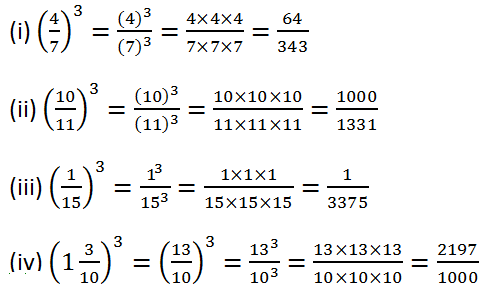RS Aggarwal Class 8 Math Fourth Chapter Cubes and Cube Roots Exercise 4A Solution
EXERCISE 4A
(1) Evaluate:
(i) (8)3 = 8 × 8 × 8 = 512
(ii) (15)3 = 15 × 15 × 15 = 3375
(iii) (21)3 = 21 × 21 × 21 = 9261
(iv) (60)3 = 60 × 60 × 60 = 216000
(2) Evaluate:
(i) (1.2)3 = 1.2 × 1.2 × 1.2 = 1.728
(ii) (3.5)3 = 3.5 × 3.5 × 3.5 = 42.875
(iii) (0.8)3 = 0.8 × 0.8 × 0.8 = 0.512
(iv) (0.05)3 = 0.05 × 0.05 × 0.05 = 0.000125
(3) Evaluate:

(4) Which of the following numbers are perfect cubes? In case of perfect cube, find the number whose cube is the given number.
(i) 125 = 5 × 5 × 5
(ii) 243 = 3 × 3 × 3 × 3 × 3
(iii) 343 = 7 × 7 × 7 = (7)3; Thus, 343 is a perfect cube.
(iv) 256 = 2 × 2 × 2 × 2 × 2 × 2 × 2 × 2; Thus, 256 is not a perfect cube.
(v) 8000 = 2 × 2 × 2 × 2 × 2 × 2 × 5 × 5 × 5
= (2 × 2 × 5)3 = (20)3; Thus, 8000 is a perfect cube.
(vi) 9261 = 3 × 3 × 3 × 7 × 7 × 7
= (3 × 7)3 = 213; Thus, 9261 is a perfect cube.
(vii) 5324 = 2 × 2 × 11 × 11 × 11; Thus, 5324 is not a perfect cube.
(viii) 3375 = 3 × 3 × 3 × 5 × 5 × 5
= (3 × 5)3 = (15)3; Thus, 3375 is a perfect cube.
(5) Which of the following are the cubes of even numbers?
Properties: The cubes of every even number are even.
(i) 216 = 2 × 2 × 2 × 3 × 3 × 3 = 23 × 33 = 63
(iii) 512 = 2 × 2 × 2 × 2 × 2 × 2 × 2 × 2 × 2 = 23 × 23 × 23 = (8)3
(v) 1000 = 2 × 2 × 2 × 5 × 5 × 5 = 23 × 53 = (10)3
(6) Which of the following are the cubes of odd numbers?
Properties: The cube of every odd number is odd.
(i) 125 = 5 × 5 × 5 = 53
(ii) 343 = 7 × 7 × 7 = 73
(v) 9261 = 3 × 3 × 3 × 7 × 7 × 7 = 33 × 73 = (21)3
(7) Find the smallest number by which 1323 must be multiplied so that the product is a perfect cube.
Solution: Writing 1323 as a perfect of prime factors, we have:
1323 = 3 × 3 × 3 × 7 × 7
Clearly, to make it a perfect cube, it must be multiplied by 7.
(8) Find the smallest number by which 2560 must be divided so that the quotient is a perfect cube.
Solution: Writing 2560 as a perfect of prime factors, we have:
2560 = 2 × 2 × 2 × 2 × 2 × 2 × 2 × 2 × 2 × 5
Clearly, to make it a perfect cube, it must be multiplied by 5 × 5 = 25.
(9) What is the smallest number by which 1600 must be divided so that the quotient is a perfect cube?
Solution: Writing 1600 as a product of prime factors, we have:
1600 = 2 × 2 × 2 × 2 × 2 × 2 × 5 × 5
Clearly, to make it a perfect cube, it must be divided by (5 × 5) = 25.
(10) Find the smallest number by which 8788 be divided so that the quotient is a perfect cube.
Solution: Writing 1600 as a product of prime factors, we have:
8788 = 2 × 2 × 13 × 13 × 13
Clearly, to make it a perfect cube, it must be divided by (2 × 2) = 4.
For more exercise solution, Click below –
Leave a Reply